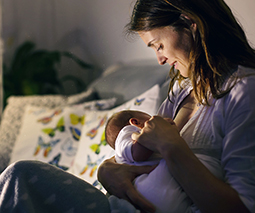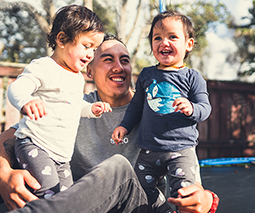3 essential things all exhausted mums need to know about sex

After a long day spent trying to anticipate the needs of a small but very demanding human, there are many, many things new mums often feel too tired to attempt at night – making the dinner, washing their hair, folding the laundry. But probably the chore – because, let’s be honest, sometimes it can feel like a chore – at the top of the list, is sex.
Whether it’s because you’re still feeling tender from labour and birth, your libido is a bit out of whack, or you’re just plain exhausted, there are plenty of reasons why new mothers are slow to get back in the saddle.
Physiotherapist and women’s pelvic floor expert, Heba Shaheed speaks with Tanya Koens, sex therapist and counsellor, on the Bellies, Bits & Babies podcast about what really happens between couples during and after pregnancy, so they can best find a new way to be intimate while they are adjusting to their new roles as parents.
Let’s start at the very beginning
Firstly, Tanya says, people should be aiming to have good and pleasant sex, not sex that they tolerate – there should be no pain and no problems.
“Sex is designed so it should not be painful. So if it’s hurting, something is going wrong and it shouldn’t be tolerated. A lot of people just put up with it to keep their partner happy and that doesn’t leave for good connective sex; it doesn’t lead to people wanting to have sex.”
Sounds obvious but for many women, pain gets in the way.
Listen to Heba and Tanya on the Bellies, Bits & Babies podcast:
There are two things that Tanya most commonly sees in her practice when clients are trying to fall pregnant or have recently given birth. One is anorgasmia, where women are having difficulty having an orgasm, and the other is painful sex, which can, as Tanya explains, “get in the way of people getting pregnant or people coming together with their partner because they find it very difficult to speak about, and start avoiding sex rather than dealing with it. A lot of the women I see have spent years trying to deal with it before they’ve come along to see me.”
Beyond that, Tanya says there are three things we need to know about sex and intimacy to help us find our groove again:
1. Know your body, know yourself
The female sexual anatomy generally doesn’t operate on the same timeline as their partner’s. Women need time to relax and warm up.
“Having intercourse with not enough arousal going on in their body can lead to tissues tearing or just discomfort and pain, and then over time this can lead to the body starting to tense up and flinch when they’re thinking about sex and anticipating pain, and that can lead to hypertonic muscle spasms,” Tanya says.
“I think most people think that a vagina is like a little hole that’s waiting for a penis to drop in for a visit. But actually, it’s kind of like a flat balloon most of the time. So we need it to arouse.
“It takes women’s bodies 45 to 60 minutes to become fully aroused – now a lot of people can have intercourse before that, but it’s good to know that our bodies take time for the blood to come in and for the cells in the body there to fill up with blood.”
2. The journey is just as important as the destination
While it may seem crazy to spend more time on sex when you’re super tired, it actually makes a lot of sense because you will enjoy it more in the long run.
Heba says that it’s usually foreplay that’s sacrificed in the name of efficiency, but doing so can actually be the cause of painful sex.
“Whenever I see a woman who comes to me for painful sex, one of the things that I ask is, how long do you spend on foreplay? And the average I get is about five to 10 minutes, which is crazy,” Heba says. “So I educate them about what’s actually happening in the arousal system and how long it takes for the pelvic floor muscles to actually relax. And beyond that, that there’s more than that in the arousal system – the vagina balloons, it opens up, the uterus lifts up and out of the way …’
Tanya adds, “And that pulls back the cervix, so if you want to have porn star kind of pounding sex, that’s the time to have it when your body is cushioned; you can take the regular thrusting.”
In fact, Tanya thinks that if we stopped focusing on penetration, then we’d all be having a better time: “I think everybody seems to be in a hurry to get to the P in V part, right? If you go out for dinner, do you bolt down all of your dinner so that you can get to dessert?! Can we not have a really nice journey till we get to the good bit or the finale?
“I encourage people to take time and to explore, and I think what happens then is they realise they don’t know what feels nice for them. There needs to be a little bit of exploration because there are many, many delicious things you can do for outer-course – which is everything aside from intercourse.”

3. Don’t wait to go to bed to have sex
When are you most likely to be in the mood – and have the energy – for sex? Last thing at night? No!
“Don’t wait to go to bed to have sex,” Tanya advises. “I ask lots and lots of people, ‘When do you expect to have sex?’. [Their answer is] ‘When we go to bed.’ I say, ‘Oh okay, when do you go to bed?’ [They say,] ‘When we’re tired’. And then I can see the penny drop.”
Instead, schedule in some time together – without the kids – doing something you both enjoy. It doesn’t have to end with sex but investing time in building trust and intimacy is important too.
“Get Grandma to look after the kids on Saturday afternoon and have a relaxed time where you’re chatting and doing something nice. [Don’t worry about] scheduling sex; people get a bit anxious about performing, and they’re like, ‘I don’t like that it’s scheduled. It’s not nice and natural as it was’.
“So this making conscious time to spend with your partner is really hard. I say to people, ‘Look, if you have children under five years old, I’m not going to lie – your sex life will take a hit, but it doesn’t have to disappear’. It’s about being realistic and being kind.”
Which is an excellent place to start when you’re trying to find a happy place with your partner.
 Need some support to be the best parent you can be? Our Parent School parent coaching experts can help. Click to find out more or book a one-on-one session.
Need some support to be the best parent you can be? Our Parent School parent coaching experts can help. Click to find out more or book a one-on-one session.













